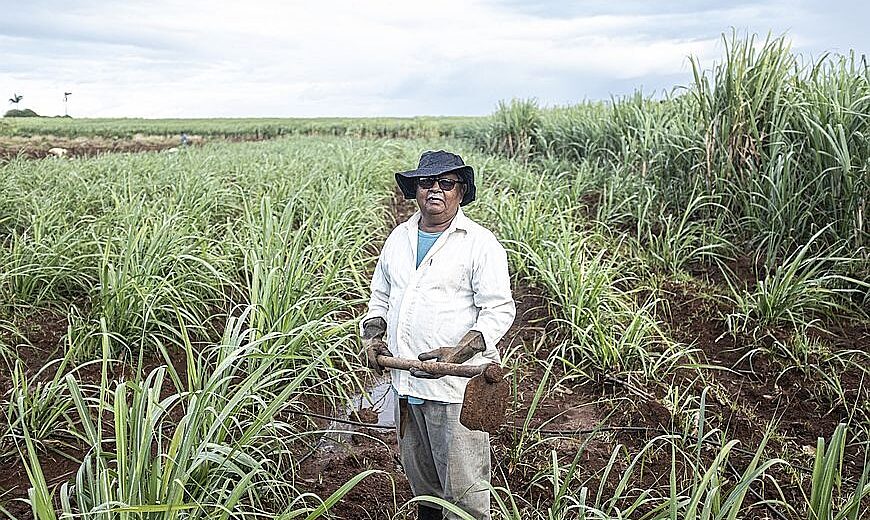5 Jul 2023
Sweetening the deal: How Fairtrade sugar cane farmers drive positive change

Miora Rajaonary / Fairtrade Deutschland
It's summertime in the northern hemisphere, and that means sweet treats: ice cream, lemonade, fruity baked goods, and more!
Fortunately, Fairtrade sugar cane farmers are a positive force for driving economic, social and environmental progress -- proving that a sweeter taste can go hand-in-hand with sweeter impact.
A recent report pointed to progress on climate change mitigation, accelerating good agricultural practices, and improvements in labour conditions on Fairtrade sugar cane farms in Mauritius. The island country is home to around 20 Fairtrade certified sugar cane cooperatives with close to 2,300 farmer members.
Commissioned by Fairtrade International and conducted by Agricane Consulting, the study also found that Fairtrade has had positive impacts on the economic, environmental, and social resilience and sustainability of small-scale sugar cane producers.
“This exciting study tracks the impact of Fairtrade Standards and how they have influenced progress in the Mauritian sugar cane sector,” said Monika Berresheim, Senior Advisor for Sugar at Fairtrade International. “It is an independent validation that Fairtrade Standards improve the viability of sugar cane producers. I am confident that it will encourage companies to commit to a long-term and stable sourcing partnership with Fairtrade certified sugar supply chains.”
The report’s authors found that Fairtrade has “positively influenced the Mauritius sugar cane industry in multiple ways,” such as providing additional financial and technical support.
Other highlights include:
- The Fairtrade Premium provides a vital cash injection for small-scale farmers struggling in challenging times, and is a “lifeline” for farmers and the sustainability of the industry.
- Good Agricultural Practices: 97 percent of Fairtrade sugar cane farmers who participated in the Mauritian study reported more efficient use of fertilisers, and 99 percent said they used fewer harmful chemicals.
- Higher yields: 56 percent reported improved sugar cane crop yields.
- Better labour conditions: 93 percent of farmers in the study reported an improvement in the conditions for workers, as opposed to just 40 percent of the non-certified farmers.
- Good governance: 96 percent of farmers in the study reported an improvement in the overall governance of their producer organisations and leadership of their boards.
“Fairtrade Standards are tough and can be challenging for small-scale sugar cane farmers,” added Fairtrade's Monika Berresheim. “That makes their achievement all the more impressive. I applaud our partners in Mauritius who are making significant strides towards building a fairer and more sustainable world for all."
She continued: “Sugar cane farmers face unprecedented challenges including the constantly increasing cost of inputs, skyrocketing prices of imported fertiliser, and volatile global sugar markets. This leaves cooperatives in Mauritius and elsewhere with insufficient funds to invest into productive sugar cane. Companies that source Fairtrade sugar are investing in more sustainable production and helping to support farmers. To buffer the challenges, Fairtrade is running two programs in Mauritius (and elsewhere): the Better Labour Practices and Climate Resilient Cane Production program, improving the situation of sugar cane farmers and reducing risks in sugar supply chains."
The study has been welcomed by Fairtrade certified cooperatives and others in the Mauritian sugar industry. “The results provide reassurance that Fairtrade is a proven sustainability vehicle,” said Chetanand Dookhony, Head of Compliance and Producers’ Services at the Mauritius Sugar Syndicate (MSS). “We look forward to continuing our collaboration with Fairtrade as we work to achieve a fully sustainable sugar cane sector.”
Noting the improvement in labour practices, Purmanee Newaj, Board member of Petit Paquet Multipurpose Cooperative Society, said, "As a cooperative, people are at the heart for everything we do. Fairtrade has further strengthened our commitment to protect the fundamental rights of workers and producers in the supply chain.”
“The survival of our cooperative is driven by Fairtrade in a difficult context where sugar cane farmers are striving to meet high operation costs,” added Khavam Ramkissoon, secretary of the La Martiniere Multipurpose Cooperative Society. "Harnessing the potential of all, including women and young people, is key to unleashing the full productivity potential of countries like Mauritius which face rapid ageing of the farming community."
Choosing Fairtrade sugar sweetens more than just taste -- it means greater benefits and a fairer future for farmers and their communities.